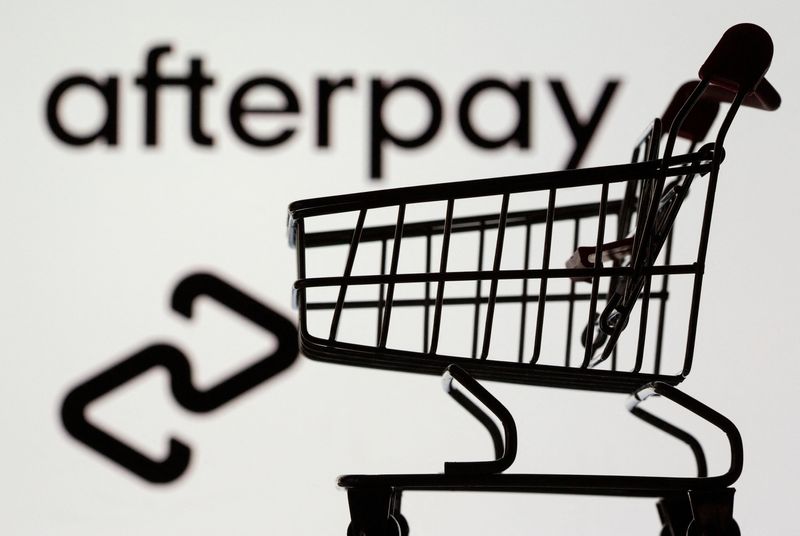By Byron Kaye and Lewis Jackson
SYDNEY (Reuters) - When Melbourne barista Melinda Elliott had to cut back on casual work shifts this year, she asked her buy-now, pay-later (BNPL) provider, Afterpay, to lower her credit limit. She did not want debt she could not afford to repay.
The Australian company, owned by Twitter founder Jack Dorsey's Block Inc, cut her limit to A$2,000 ($1,300) from A$3,000, but a few months later she added up the debts in her account and saw the limit had returned to A$3,000, the maximum available.
"There was no email to say, 'your credit limit's gone up again'; it was out of nowhere," said Elliott by phone. "I don't want to spend more than what I actually make from working."
Elliott's experience highlights a core feature of a startup business model that has disrupted consumer finance around the world. But that feature and others may soon be banned in Australia under a proposal to regulate BNPL with the same law that covers credit card and mortgage providers.
Whereas credit card issuers collect both interest payments and vendor fees, BNPL companies attract users by charging nothing for credit, instead relying almost entirely on revenue from retailers. By monitoring users' repayment performance on generally small balances to control risk, they require no background checks, so signing up is easy and the companies' costs are low.
The absence of interest charges has exempted them from consumer credit regulation, and the sector's business has grown strongly during an online shopping frenzy spurred by COVID-19 stimulus payments and ultra-low interest rates.
Now it faces a challenge as Australia, home to more than a dozen listed providers, looks at adding protections for shoppers. According to a discussion paper published by the Treasury on Nov. 21, that may include bringing the providers under the National Consumer Credit Protection Act, which bans unsolicited credit-limit increases and requires background checks for most consumer lending.
Already shares of the companies, which soared in the first two years of the pandemic, are down sharply in 2022 as investors see BNPL users doing less shopping, and perhaps hitting trouble in repaying balances, amid high inflation and rising interest rates on their other debts.
If they come under regular consumer credit regulation, they will also lose their main competitive advantages.
LIMIT ON CREDIT
"What it means for the companies is, yes, it would be harder to make money," said Jamie Hannah, deputy head of investments and capital markets at VanEck Australia, which holds Australia-listed shares of Block following Block's buyout of Afterpay this year.
In a scenario where BNPL firms must follow the Credit Act, "maybe the credit isn't as freely available to everyone who would like to access it", added Hannah. "The whole thing needs to be looked at in the current environment."
Although Britain, the United States, which is home to BNPL provider Affirm Holdings Inc, and Sweden, home to rival Klarna, plan to regulate BNPL, so far no country has imposed regular consumer-credit rules on the sector.
Afterpay, which along with other BNPL providers has until Dec. 23 to respond to the discussion paper, said its existing system of rewarding timely repayment with credit limit increases and punishing late payment with credit cuts gave a more accurate reflection of a shopper's ability to service debt than the one-off checks required by credit-card providers.
"We would worry that that kind of proposal would have the unintended impact of providers not being able to start consumers on low spending limits in the way we have done," said Afterpay vice president of regulatory affairs Michael Saadat.
"We want any new regulatory framework not to make it harder for us to deliver the pro-consumer product construct that we've had in place for many years."
Asked about the experience of Afterpay user Elliott, a company spokesperson said customers could always ask for their limits to be lowered. The spokesperson did not address the issue of limits going back up again without request.
Number-two player Zip Co Ltd supports regulation and already runs a line-of-credit product that must comply with the Credit Act, so changes requiring it to do the same for BNPL would mean "little to no change in our procedures, depending on how they're drafted", said the company's managing director for Australia, Cynthia Scott.
The Australian Securities and Investments Commission, which oversees the Credit Act, told Reuters it was "supportive of the BNPL sector being subject to regulation".
The government wants the law changed by late 2023.
FADING APPEAL
The appeal of the industry may be dulling, anyway.
In every month since June, there have been fewer on-line searches for market leader Afterpay than a year earlier, according to research conducted for Reuters by analytics firm SimilarWeb. Searches for Zip have been down all year.
"It's clear that economic pressures and rising interest rates are starting to take their toll on discretionary spending," said SimilarWeb senior insights manager David Carr.

Once regulation took effect, some accounts would be shut down, said UBS analyst Tom Beadle.
"Is it one extra account that gets shut down, or a million?" he said. "You can't quantify that."